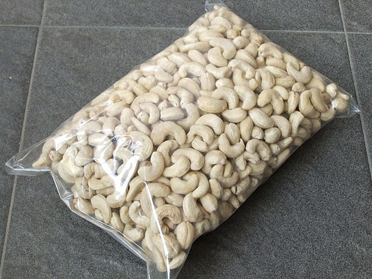Cashew Kernels

Cashew Nut Kernels is Processed from Raw Cashew. Cashew Kernel intact from the shell and grading them carefully to superior standards required by top food companies all over the world. Cashew is consumed all over the world as a snack or used as a food ingredient.
The un-shelled nut is steamed to soften the shell and carefully cut open. The kernel is dried to loosen the skin which is then peeled off. Whole kernels are graded by size and color. Pieces are chopped into required sizes.
It is estimated that 60 percent of cashew kernels are consumed in the form of snacks while the remaining 40 percent are included in confectionery. The cashew competes in the same market as other edible nuts
Cashew kernels are extracted form the raw cashew nuts by roasting, shelling, peeling. After the removal of testa (husk) the kernels are graded into wholes, splits, butts and pieces and then packed .
Cashews are high in calories. 100 g of nuts provide 553 calories. They are packed with soluble dietary fiber, vitamins, minerals and numerous health-promoting phyto-chemicals that help protect from diseases and cancers.
-
They are rich in “heart-friendly” monounsaturated-fatty acids like oleic, and palmitoleic acids. These essential fatty acids help lower harmful LDL-cholesterol while increasing good HDL cholesterol. Research studies suggest that Mediterranean diet, which is rich in monounsaturated fatty acids help to prevent coronary artery disease and strokes by favoring healthy blood lipid profile.
Cashew nuts are very rich source of essential minerals. Minerals, especially manganese, potassium, copper, iron, magnesium, zinc and selenium are concentrated in these nuts. A handful of cashew nuts a day in the diet would provide enough of these minerals and prevent deficiency diseases. Selenium is an important micronutrient, which functions as a co-factor for antioxidant enzymes such as Glutathione peroxidases, one of the most powerful antioxidants in the body. Copper is a cofactor for many vital enzymes, including cytochrome c-oxidase and superoxide dismutase (other minerals function as co-factors for this enzyme are manganese and zinc). Zinc is a co-factor in many enzymes that regulate growth and development, sperm generation, digestion and nucleic acid synthesis.
Cashews are also rich in many essential vitamins such as pantothenic acid (vitamin B5), pyridoxine (vitamin B-6), riboflavin, and thiamin (vitamin B-1). 100 g nuts provide 0.147 mg or 32% of daily-recommended levels of pyridoxine. Pyridoxine reduces the risk of homocystinuria, and sideroblastic anemia. Niacin helps prevent "pellagra" or dermatitis. Additionally, these vitamins are essential for metabolism of protein, fat, and carbohydrates at cellular levels.
Further, the nuts are also containing a small amount of zea-xanthin , an important pigment flavonoid antioxidant, which selectively absorbed into the retinal macula lutea in the eyes. It is thought to provide antioxidant and protective UV ray filtering functions and helps prevent age-related macular degeneration (ARMD) in the elderly







